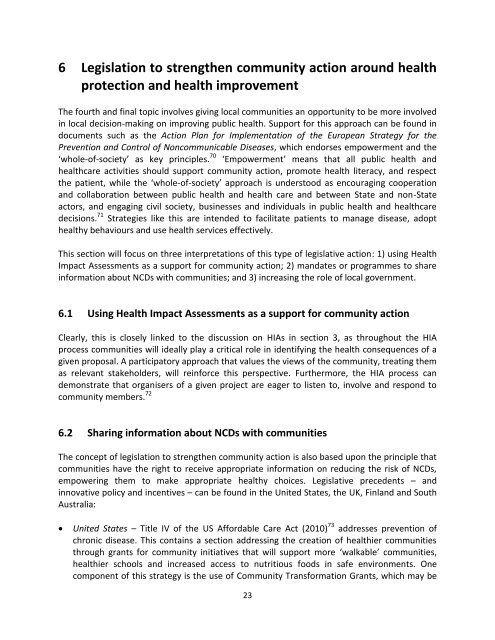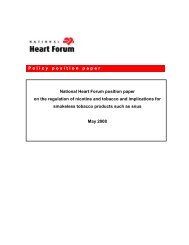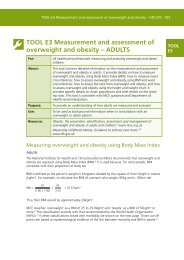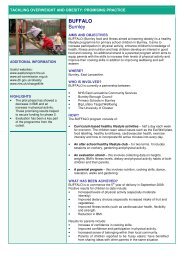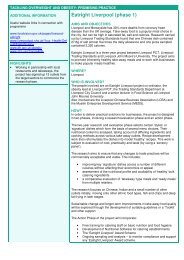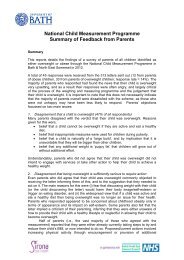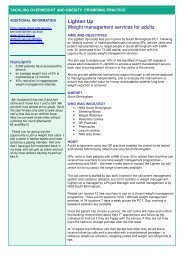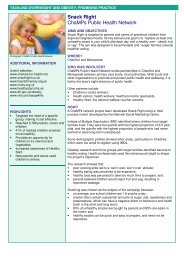Public Health Law and Non-communicable Diseases - UK Health Forum
Public Health Law and Non-communicable Diseases - UK Health Forum
Public Health Law and Non-communicable Diseases - UK Health Forum
You also want an ePaper? Increase the reach of your titles
YUMPU automatically turns print PDFs into web optimized ePapers that Google loves.
6 Legislation to strengthen community action around health<br />
protection <strong>and</strong> health improvement<br />
The fourth <strong>and</strong> final topic involves giving local communities an opportunity to be more involved<br />
in local decision-making on improving public health. Support for this approach can be found in<br />
documents such as the Action Plan for Implementation of the European Strategy for the<br />
Prevention <strong>and</strong> Control of <strong>Non</strong><strong>communicable</strong> <strong>Diseases</strong>, which endorses empowerment <strong>and</strong> the<br />
‘whole-of-society’ as key principles. 70 ‘Empowerment’ means that all public health <strong>and</strong><br />
healthcare activities should support community action, promote health literacy, <strong>and</strong> respect<br />
the patient, while the ‘whole-of-society’ approach is understood as encouraging cooperation<br />
<strong>and</strong> collaboration between public health <strong>and</strong> health care <strong>and</strong> between State <strong>and</strong> non-State<br />
actors, <strong>and</strong> engaging civil society, businesses <strong>and</strong> individuals in public health <strong>and</strong> healthcare<br />
decisions. 71 Strategies like this are intended to facilitate patients to manage disease, adopt<br />
healthy behaviours <strong>and</strong> use health services effectively.<br />
This section will focus on three interpretations of this type of legislative action: 1) using <strong>Health</strong><br />
Impact Assessments as a support for community action; 2) m<strong>and</strong>ates or programmes to share<br />
information about NCDs with communities; <strong>and</strong> 3) increasing the role of local government.<br />
6.1 Using <strong>Health</strong> Impact Assessments as a support for community action<br />
Clearly, this is closely linked to the discussion on HIAs in section 3, as throughout the HIA<br />
process communities will ideally play a critical role in identifying the health consequences of a<br />
given proposal. A participatory approach that values the views of the community, treating them<br />
as relevant stakeholders, will reinforce this perspective. Furthermore, the HIA process can<br />
demonstrate that organisers of a given project are eager to listen to, involve <strong>and</strong> respond to<br />
community members. 72<br />
6.2 Sharing information about NCDs with communities<br />
The concept of legislation to strengthen community action is also based upon the principle that<br />
communities have the right to receive appropriate information on reducing the risk of NCDs,<br />
empowering them to make appropriate healthy choices. Legislative precedents – <strong>and</strong><br />
innovative policy <strong>and</strong> incentives – can be found in the United States, the <strong>UK</strong>, Finl<strong>and</strong> <strong>and</strong> South<br />
Australia:<br />
<br />
United States – Title IV of the US Affordable Care Act (2010) 73 addresses prevention of<br />
chronic disease. This contains a section addressing the creation of healthier communities<br />
through grants for community initiatives that will support more ‘walkable’ communities,<br />
healthier schools <strong>and</strong> increased access to nutritious foods in safe environments. One<br />
component of this strategy is the use of Community Transformation Grants, which may be<br />
23


